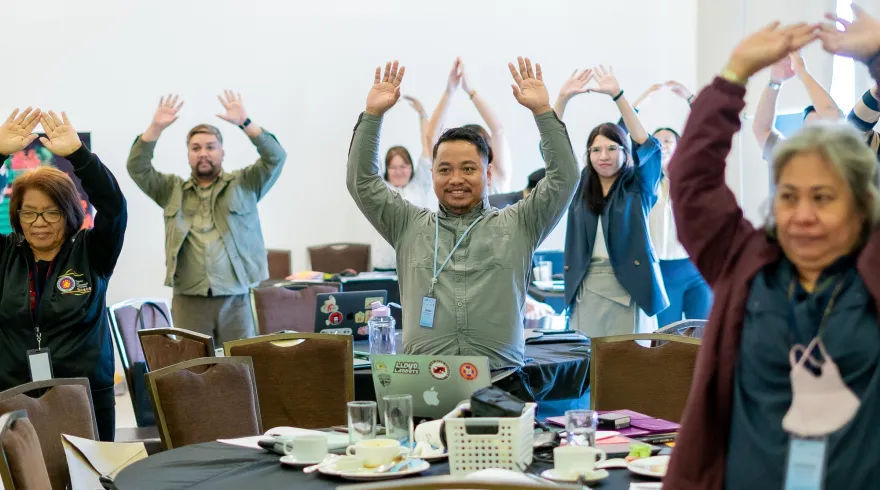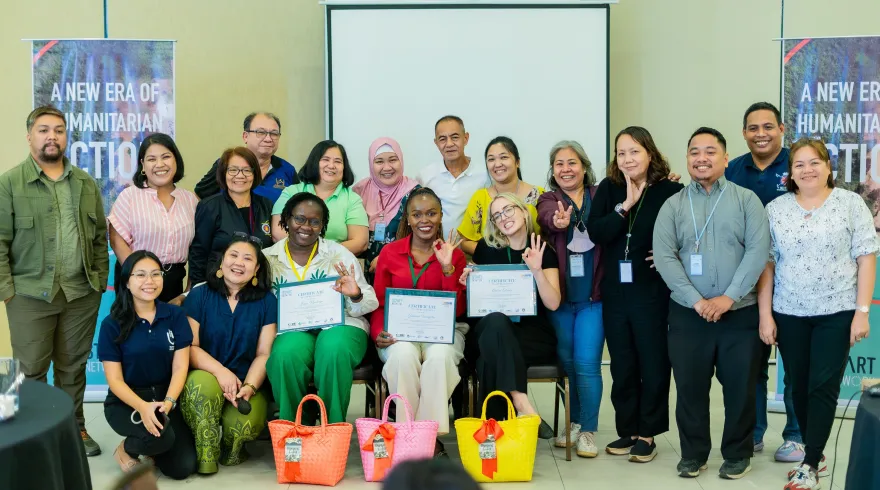The Philippines Hub (PH Hub) held an Incubation Workshop that brought together committed changemakers and strategic thinkers for a pivotal three-day gathering at the Privato Hotel in Quezon City from 17th to 19th March 2025. Organised by the Caucus of Development NGO Networks (CODE-NGO) and Start Network, the workshop’s primary objective was to strengthen the development and governance framework of the PH Hub as it moves from aspiration to the incubation stage of their hub development journey.
Participants included six members of the PH Hub Core Team: CODE-NGO, CDRC, PDRRN, PHILSSA, MINCODE, and AADC. We also welcomed representatives from the nine Regional Hub clusters including Northern Luzon, Mega Manila, MIMAROPA, Bicol, Easter Visayas, Central Visayas, Western Visayas, CARAGA, and Davao, and colleagues from local networks and NGOs across the country – including faith-based organisations such as Caritas Philippines. They were joined by three international humanitarian organisations: CARE Philippines, Humanity & Inclusion, and People in Need as well as representatives from the Start Network global team.
Participants discussed key topics on hub governance, ways of working, mutual accountability, and decision-making processes. Moreover, they engaged in a visioning exercise to identify collective interventions based on the hubs’ systems change agenda and explored how the PH Hub could be integrated into existing Start Network programs. The group also reviewed Start Network’s global membership structure and value proposition and co-created a plan for member intake and engagement. The workshop aimed to reinforce partnerships between the Start Network, PH Hub, and its host organisation.

From Vision to Reality
The workshop opened with a powerful visioning exercise, sparking a dialogue around the future of the PH Hub. This session laid the foundation for building a governance structure grounded in collaboration, mutual accountability, and sustainability. Conversations quickly turned towards what it would take to transform the hub from a promising idea to a fully functional and locally led platform. Participants explored sustainability models starting from seed funding and agreed to refine these options throughout the incubation phase.
Governance, Operations, and the Big Picture
Day two took a deep dive into operational realities. In a dynamic split-session, one group focused on refining hub operations—highlighting staffing, communication, coordination, data management, and programme implementation as priority areas. The second group zeroed in on governance and membership structures, addressing policy reviews, regional engagement in preparation for a future General Assembly, and defining a strategic regional focus where localisation could thrive.
The group clarified roles and accountability for various functions and set the stage for coordinated action. A roadmap was then drawn to outline strategic goals, priorities, and activities for the PH Hub, ensuring alignment with the broader Start Network vision.
An overview of governance setup, attraction and selection, and induction processes was discussed. Key discussions included the role of the Hub in building the capacity of members, ensuring that membership protocols are adapted to the Philippine context rather than starting from scratch, and strategically planning membership growth. The PH Hub aspires to focus on strengthening local and regional networks while being part of the Start Network. The PH Hub was identified as a priority for member expansion, with a goal of adding 2-3 new members to be part of Start Network.

Spotlight on Membership and Programmes
On the final day, the conversation returned to membership. Participants revisited the objectives and agreed to include local NGOs advocating for people with disabilities in future membership planning. Plans were also made to hold a General Assembly in September 2025, with a Membership Committee to be formed to guide the process. The Hub’s objectives were refined to reflect community-led action, innovation, anticipatory approaches to emergency response, and climate resilience.
The Start Network Country Anticipatory Risk Financing (CARF) team in the Philippines presented Start Network’s global humanitarian financing mechanisms, including Start Ready for pre-agreed crisis funding and Start Fund, which releases rapid response financing within 72 hours. Participants also explored FOREWARN, the network’s crisis anticipation platform, and discussed how these initiatives could align with the PH Hub’s priorities. A proposal was raised to establish a governance group to ensure stronger programme integration and localisation. The hub structure was reviewed to determine how Start Network PH’s disaster response efforts, particularly for floods and droughts, could align with the Hub’s initiatives. It was emphasised that Start Network PH governance and programs would be led by local NGOs, ensuring alignment with locally led action goals.

Strengthening Local Leadership
A dedicated session looked at how Start Network could continue supporting the PH Hub. Participants requested capacity-building initiatives, access to Start Network tools and templates, and support for community organising. Transparency and accountability were flagged as critical, and a decision was made to hold quarterly meetings moving forward
Action Planning and Looking Ahead
The workshop concluded with a forward-looking Incubation action planning session, where participants identified clear next steps, assigned responsibilities, and agreed on timelines.
As the PH Hub steps confidently into its next chapter, this workshop served as both anchor and launchpad—a space where collective vision met action, and where the seeds of a vibrant, locally led network were sown.

